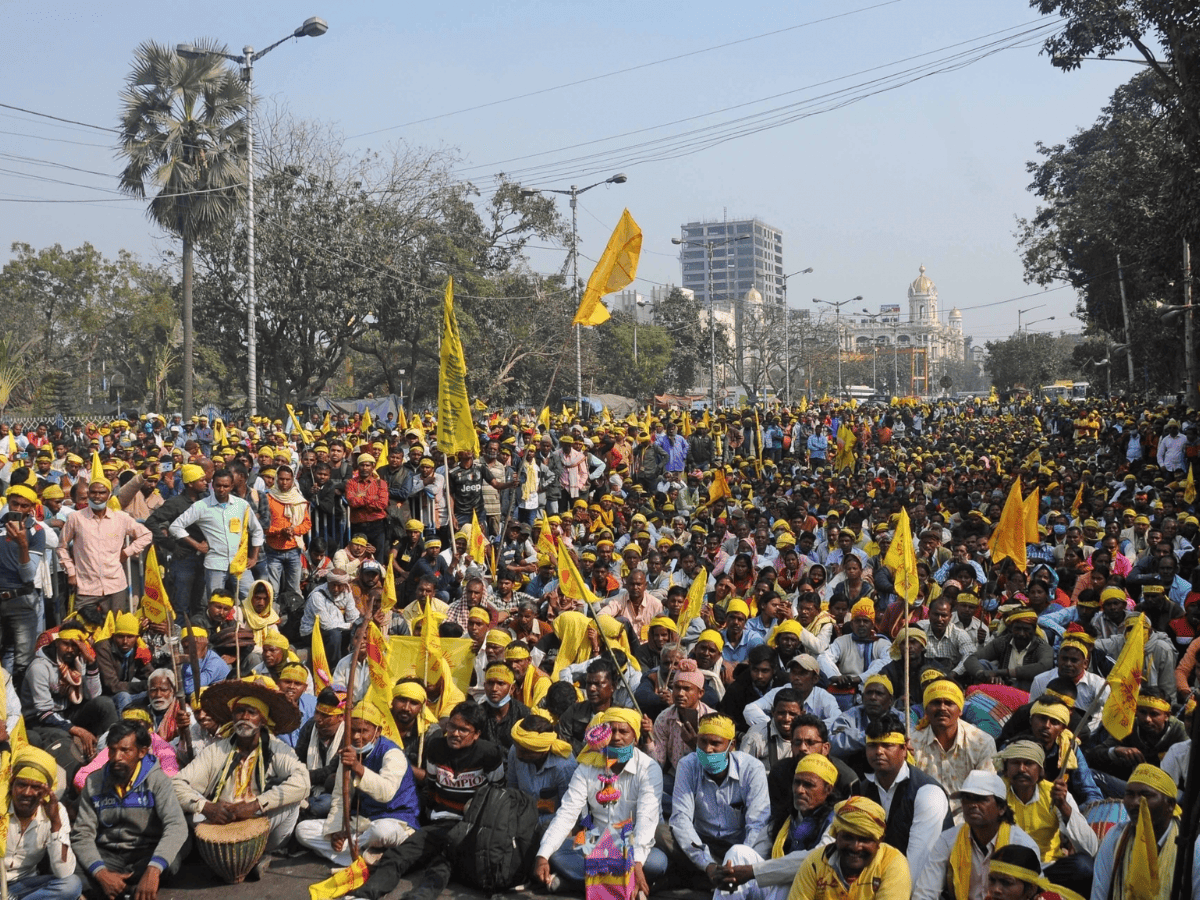
Kolkata: The simmering cold war between the West Bengal government and the people from the Kurmi community in the state over the latter’s demand for a Scheduled Tribe status seems to be erupting over the three-tier panchayat polls in the state scheduled this year.
Train and bus services in the three tribal dominated districts of Bankura, Purulia and West Midnapore were crippled for a major part of last month following the road and rail blockade agitations by the Kurmis.
At the same time, they have started a major campaign “All Walls to Kurmi” notifying that the walls of any property owned by the Kurmis will not be allowed for wall graffiti for the forthcoming rural civic body polls.
There was further aggravation after senior Trinamool Congress leader Ajit Maiti, at a public meeting described the attitude of the Kurmi leaders as that of those spearheading the Khalistan movement. Irked by such comments the Kurmi leaders have called for a total boycott of the panchayat polls.
What is intriguing is that both the West Bengal government and the Trinamool Congress leadership are treading a balancing path over the Kurmi movement on this issue, with one section of the party condemning the agitation and the other section adopting a softer approach.
During the rail and road blockades, the state government did not take any initiative to remove the blockades. Instead it assured the GRP and RPF authorities of cooperation in case the railways forces acted to lift the blockades.
Again when Maiti’s comments had the Kurmis fuming, chief minister Mamata Banerjee herself came forward for damage control by apologising on behalf of her party legislator.
Kurmi leaders like Ajit Prasad Mahato and Birendranath Mahato have explained why they are specially aggrieved over the role of the state government. According to them, the main grievance of the agitators is that the West Bengal Cultural Research Institute, a state government body that works for indigenous tribes, is yet to recognise the Kurmis as representatives of primitive tribes. They also alleged that the reluctance of the institute or the state government to send a comprehensive report in the matter to the Union government is holding back the process of recognition of the Kurmi community under the Scheduled Tribe category.
“Recently, we also had a meeting with the state government representatives. However, the meeting turned out to be fruitless as the state government failed to project any specific solution,” Ajit Prasad Mahato said.
Trinamool Congress leaders like Maiti claim that the Kurmi leaders are wrongly holding the state government responsible. According to him, neither the chief minister nor the state government has the power to grant scheduled tribe status. He also pointed out that the chief minister is serious about the demands of the community and had written to the Union government recently seeking updates on this matter.
Why is the Trinamool Congress playing a balancing game on this issue? According to political observer Sabyasachi Bandopadhyay, the answer lies in the results of the 2019 Lok Sabha polls and the 2021 West Bengal assembly polls in the three tribal-dominated constituencies of Bankura, Purulia and Midnapore district, where Kurmis form a substantial portion of the total voters. “In the 2019 BJP managed victory in six out of seven Lok Sabha seats from these three districts. Although in 2021, the saffron camp could not maintain the same trend, the results there for the BJP were better than in the other major districts. In 2021 the BJP won in 16 out of 40 assembly constituencies from these three districts. So one can understand why the state government and the ruling party are playing a balancing game considering the complexity of the situation,” Bandopadhyay added.
Political columnist Amal Sarkar pointed out that the BJP’s success in the tribal belts in 2019 and 2021 was because of the Banabashi Parishad, the tribal wing affiliated to the RSS rather than the BJP’s own organisational strength. “This wing had been working not only in the tribal belts of Bankura, Purulia and West Midnapore, but also among the tribal communities in North Bengal. The BJP just took political advantage of the activities of the wing. Just as in these three districts, the BJP performance both in 2019 and 2021 was also better in the tribal belts of North Bengal compared to other pockets of West Bengal,” Sarkar said.
He added that the agitation of the Kurmi community is also because the people of the community have remained financially backward for a long time.

